Understanding Why Birds Make Great Companion Pets
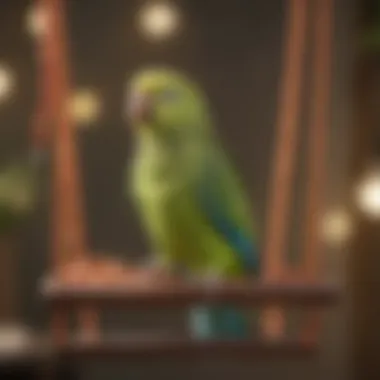
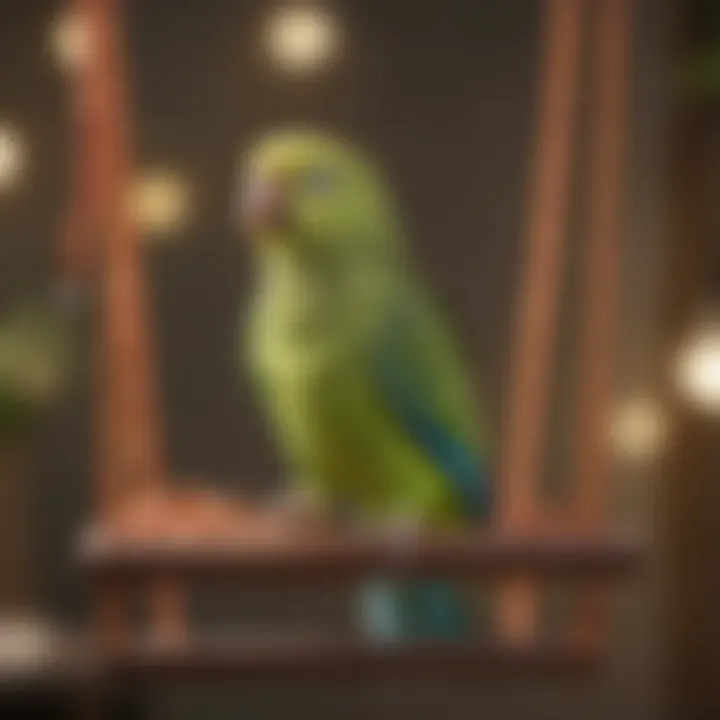
Intro
When considering a new pet, the choices abound – from the lively canine to the aloof feline. However, birds as companions often fly under the radar yet hold unique charms that can captivate many. Unlike typical household pets, birds offer a fresh dynamic, showcasing vibrant personalities and intricate social behaviors. They are not just creatures in a cage; they can become integral members of the family, fostering emotional connections that rival any other companion animal.
This exploration delves into the myriad reasons birds make ideal pets, touching on aspects of care, interaction, emotional well-being, health, and those delightful quirks that one rarely thinks of. Understanding their needs and uniqueness is key to forming a bond that goes beyond feeding and cleaning. After all, creating a loving environment for a feathered friend not only enriches their life, it heavily influences our own too. Let's spread our wings and dive into the essentials of avian companionship.
Avian Care Basics
Caring for birds takes more than just a passion for their beauty; it demands knowledge and commitment. Below, we examine some core areas that form the foundation of avian care, ensuring your future feathered friend thrives.
Importance of Proper Nutrition
Nutrition plays a pivotal role in the well-being of pet birds. They require a balanced diet to maintain vibrant plumage, energetic movement, and overall health. Instead of relying solely on birdseed mixes, which lack essential nutrients, consider incorporating fresh fruits like apples and vegetables such as carrots into their meals.
Research suggests that a varied diet can reduce the risk of diseases that often affect birds. It's not merely about filling the food container, but about making sure your bird gets a wholesome mix that mirrors their natural dietary habits.
Understanding Bird Species and Their Needs
With hundreds of species, each bird arrives with its own set of requirements. For instance, parakeets, commonly known as budgerigars, are known for their sociable nature, while certain larger species like parrots require more space and mental stimulation. Identifying the specific needs of your chosen species is vital before introducing them into your home.
Basics of Birds Habitat Setup
Creating a sanctuary for your bird is essential. The size of the cage, placement, and accessories like perches, toys, and food dishes influence their quality of life. A spacious cage allows for movement and exploration, while engaging toys provide necessary stimulation. Remember, birds like to chew, so a variety of safe chewable items enhances their habitat.
Grooming and Hygiene Tips
Hygiene cannot be overlooked. Regularly cleaning the cage is necessary to prevent disease. Birds also benefit from occasional baths, which help in keeping their feathers clean and healthy. Using dishes shallow enough for birds to splash in can simulate their natural bathing behaviors, leading to both enjoyment and wellness.
"A happy bird is a healthy bird. Invest in their care, and they reward you with companionship and joy."
Interacting with Your Pet Bird
Interaction is the lifeblood of your relationship with your avian companion. The way you bond with your bird shapes its personality and enhances its ability to connect.
Building Trust and Connection
Trust is essential in bird-human relationships. Spend time quietly near your bird, allowing them to get used to your presence. Gradually introduce your hand for them to explore, offering treats as encouragement. This patience pays off as your bird learns that you are a friend rather than a threat.
Training Techniques and Tips
Training a bird can resemble teaching a child – it requires consistency and reinforcement. Short sessions work best. Using simple commands paired with rewards helps birds learn quickly. A well-trained bird not only brings joy but is also safer in an environment filled with potential dangers.
Fun Activities for Bird Owners and Their Birds
Birds love to play! Incorporate fetch-like games with small toys or encourage your bird to climb through hoops for treats. Not only does this serve as exercise, but it fosters interaction and keeps their minds sharp.
Recognizing Bird Cues and Behaviors
Understanding your bird’s body language is key. For instance, puffing up may indicate they're feeling threatened, while a relaxed stance suggests they're comfortable. Learning to interpret these signals enhances communication and deepens your bond.
Emotional Well-Being of Birds
Birds are emotional creatures. Neglecting their feelings can lead to issues like stress or depression.
The Role of Play and Socialization
Regular playtime and socialization are crucial. Birds that spend too much time alone may experience loneliness, so daily interaction helps immensely. Rotating toys to keep their environment fresh has a positive impact too.
Enhancing Birds' Emotional Health
Just like us, birds flourish in an engaging environment. Singing, talking, or whistling not only entertains them, but it also encourages them to vocalize, an important aspect of their emotional expression.
Assessing Bird Stress and Remedies
Recognizing signs of stress early can prevent larger problems. Symptoms such as excessive feather plucking or aggressive behavior signal that something might be amiss. Implementing calming techniques, like soft music or a quiet space, can mitigate this stress.
Building Strong Human-Bird Bonds
Establishing a robust bond often involves shared experiences. Collaborating on activities, such as cooking safe meals that both you and your bird can enjoy solidifies your relationship. Remember, a happy bird brings immense joy, but it begins with you investing the time and effort.
Bird Health and Safety
To maintain a lush, vibrant companionship, health and safety must remain at the forefront.
Common Health Issues and Prevention
Every species has its vulnerabilities. For instance, a well-known issue among cockatiels is respiratory problems. Regularly cleaning the environment and avoiding exposure to harsh chemicals plays an integral role in prevention.
Routine Veterinary Care
Consulting a veterinarian who specializes in avian health is essential. Regular check-ups catch issues before they escalate, keeping your bird thriving.
Environmental Hazards to Avoid
Do not ignore potential hazards. Items like Teflon pans or certain houseplants can be lethal. Research and identify safe household items, ensuring your bird’s environment is secure.
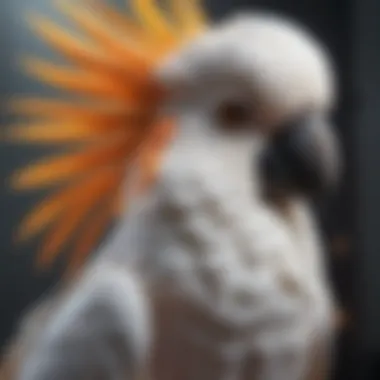
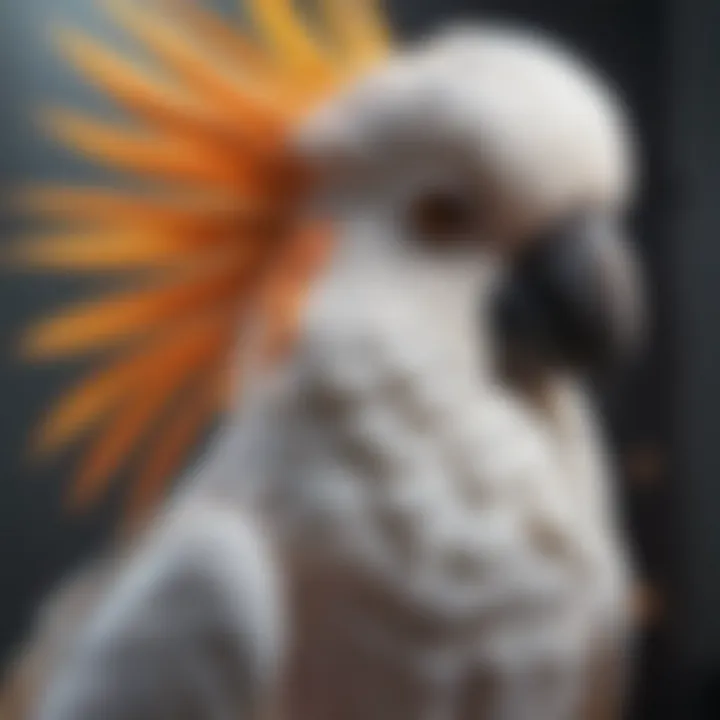
Signs of Illness or Distress
Being observant aids in catching problems early. Signs such as changes in eating habits, lethargy, or abnormal droppings require immediate attention. Knowing what normal looks like enables better care.
Fun Facts and Quirky Insights
Birds often carry untold stories! Here are some delightful facts that bring birds to life.
Unique Traits of Popular Bird Species
Some birds can dance to the rhythm of music, while others showcase impressive mimicking skills. African Grey parrots' vocal talents amaze many, proving their cleverness.
Historical and Cultural Significance of Birds
Throughout history, birds have played a role in culture, symbolizing freedom, love, and fidelity. Their presence in literature and art underscores their deep connection with humanity.
Famous Bird Owners and Their Stories
Numerous celebrities share their lives with birds. Consider Jim Carrey, who is known to have a cockatoo, or the late John Lennon with his beloved parakeet. These stories illustrate how people form connections that transcend words.
Birds enrich our lives in unique ways, from companionship to emotion. Through understanding their needs and quirks, we form bonds that nourish both our spirits and theirs.
The Appeal of Pet Birds
The allure of pet birds lies in a blend of their unique characteristics, vibrant personalities, and the emotional connections they foster. For many people, especially those living in spaces where traditional pets like dogs and cats might be difficult to accommodate, birds emerge as the ideal companion. Not only colorful and lively, but these creatures also offer a form of companionship that can be both rewarding and fulfilling.
Owning a bird provides a special chance to connect with nature in a compact form. It allows individuals and families to appreciate the beauty of the avian world without needing vast outdoor spaces. In this section, we will explore two key aspects of this appeal: the strong connection with nature that birds facilitate and their wonderfully diverse personalities.
A Connection with Nature
In a world increasingly dominated by technology and urbanization, having a pet bird can serve as a crucial reminder of nature's splendor. The sights and sounds of birds can transport us mentally to serene environments, establishing a sense of peace that is often hard to find in our busy lives. The rustle of feathers, the cheerful chirps, and the vibrant plumes become soothing elements of the daily routine.
Birds, from the smallest budgies to the grandeur of macaws, encapsulate the wild essence. Observing their behaviors brings a deeper understanding of their instincts and natural habits. For instance, the way a parakeet preens or a cockatiel bathes can reveal the intrinsic joy found in simple acts. This not only highlights their need for comfort and care but also, in a way, encourages their human counterparts to slow down and appreciate the moment.
Moreover, keeping birds as companions often inspires individuals to become more environmentally conscious. Many bird owners find themselves researching native species, conservation efforts, and habitat preservation, fostering a cycle of admiration and responsibility that can extend beyond their feathered friends.
Diverse Avian Personalities
One of the most captivating aspects of pet birds is their astounding variety of personalities. No two birds are alike, much like individuals, bringing a dynamic flavor to pet ownership. Some birds are outgoing and social, eager to be at the center of attention, while others may lean toward a more reserved or contemplative demeanor.
For instance, you might find the chatty nature of a cockatiel playfully mimicking your voice while a quieter canary might charm you with its delicate songs.
Research indicates that many birds exhibit unique traits that can often surprise their owners. Some may be problem-solvers, actively engaging in puzzle games, while others display affectionate behaviors, like snuggling or nibbling fingers, that endear them to their humans. Below are a few intriguing personalities showcased in popular pet bird species:
- Budgies: Often cheerful, budgies possess a playful spirit. Their curiosity leads them to explore and interact actively.
- Caiques: Known as the clowns of the avian world, caiques are typically full of energy and mischief.
- African Grey Parrots: Renowned for their intelligence, these birds often form deep connections and display considerable emotional depth.
This diversity among avian companions ensures that bird ownership is anything but dull; every day can bring a new surprise, a new quirky behavior to enjoy or perhaps a new trick to learn. This sheer variety in personality fosters a connection with the bird that can be deeply fulfilling.
To encapsulate, the appeal of pet birds rests not just in their outward beauty but in the connections they allow us to forge both with nature and with other living beings. Whether you are looking for a companion to share your space or someone to enliven your daily routine, birds seem to be one of the best fits for many pet lovers.
Social Dynamics of Birds
Understanding the social dynamics of birds offers a fascinating glimpse into how these creatures interact not only with each other but also with humans. This topic is crucial in exploring why birds make remarkable companion pets. When we think about choosing a pet, their ability to form social bonds and communicate is essential. Birds are remarkably social animals. They possess different types of interactions that can enrich their lives and ours.
The Sociability of Companion Birds
Birds thrive on social connections. Many species, such as budgerigars and cockatiels, live in flocks in the wild. This inherent sociability can translate into their behavior as pets. Unlike other pets that may prefer solitude, birds often seek companionship, making them unique in the pet world.
In homes, a pet bird may form a close relationship with their owner. They show affection through various behaviors like preening you or mimicry. For example, a cockatiel might sit on your shoulder, singing softly. This behavior demonstrates their friendly nature, and it can create a deep bond between the bird and its owner.
Having a companion bird means you have a pet truly interested in human interaction. Birds will respond to your voice and movements, making them active participants in daily life rather than just passive observers. This quality can lead to enhanced joy in home environments, as the emotional engagement is substantial and fulfilling.
Communication Techniques
Birds possess a unique ability to communicate, which enhances their sociability. The conversation between a bird and its owner can be both expressive and enriching. Birds utilize vocalizations, body language, and even learned sounds to express their needs and feelings.
- Vocal Mimicry: Many birds, like African Grey Parrots, can mimic human speech and other sounds. Their ability to imitate creates an interactive experience that can feel like a dialogue. This talent not only entertains but also fosters a sense of companionship.
- Body Language: Observing a bird's posture can reveal its mood. A relaxed bird often has ruffled feathers, while a bird that feels threatened might puff-up or open its beak. Learning to interpret these cues builds a deeper connection, allowing owners to understand their birds better.
- Behavioral Signals: Birds often engage in behaviors like bobbing their heads or spreading their wings to communicate happiness or curiosity. Recognizing these signals allows pet owners to engage positively, reinforcing the bond.
"A bird's song is more than just noise; it’s an invitation to connect, a way to share its world with you."
Emotional Bonds and Connections
The significance of emotional bonds between birds and their owners is a key component in understanding why these creatures can make such exceptional companion pets. The connection formed is not merely a passing phase but can evolve into a profound relationship that enriches the lives of both parties. Birds, with their unique social structures and behaviors, have a way of intertwining their lives with our own, creating mutual affection and companionship that is deeply rewarding. This segment will delve into the nuances of avian affection and the potential challenges that may arise in bonding with these delightful creatures.
Understanding Avian Affection
Birds are fascinating beings with emotional lives that often mirror those of other pets. They can express a range of feelings, from happiness to discomfort, often showcasing these emotions through vocalizations, body language, and even their interactions with humans. When a parakeet, for instance, chirps exuberantly or nuzzles its owner, it’s often a display of affection rather than mere instinct.
Birds have been known to forge strong emotional ties with their owners, sometimes even preferring human companionship over interactions with other birds. These bonds can manifest in several ways:
- Vocal Mimicry: Birds often mimic the sounds of their favorite people. This behavior is not just for amusement; it signifies their desire for social interaction and connection.
- Physical Affection: Many birds enjoy snuggling, preening, or sitting on their owners’ shoulders. This physical contact is a significant way they express their affection.
- Trust Development: When a bird feels safe around a person, they may relinquish their natural cautiousness, showcasing how trust is pivotal in cultivating affection.
The joy of watching a bird respond positively to your presence is part of what makes bird ownership unique. Understanding these affectionate behaviors can lead to deeper emotional bonds, allowing pet parents to appreciate their feathered companions even more.
Challenges in Bonding
While building bonds with birds can be deeply fulfilling, there are also hurdles to overcome. Each species and individual bird has its own personality, which means that not all birds will bond with their owners in the same way or at the same pace.


Some challenges might include:
- Fear and Anxiety: New environments can be overwhelming for birds. If a bird is scared, it may take time to build trust. Pushing too quickly can cause setbacks.
- Time Commitment: Birds require time and consistent interaction to develop a bond. Owners who may not have enough time might find it difficult to establish a strong emotional connection.
- Species-Specific Traits: Certain species may take longer to bond due to their inherent traits. For instance, African Grey Parrots, known for being intelligent, may be more demanding and require more patience compared to more sociable Cockatiels.
Every avian companion comes with its own personality quirks and preferences, making it crucial for owners to tune into these subtleties. A bit of understanding, alongside patience, can go a long way in overcoming initial bonding challenges. This journey might require effort but is often well worth it for the warmth and joy that results from a solid relationship.
The companionship formed with birds isn't just about keeping them in a cage; it's about nurturing emotional bonds that flourish over time, often leading to fulfilling relationships.
Practical Advantages of Bird Ownership
Birds bring a host of benefits that make them stand out as ideal companions. Their unique characteristics, combined with their manageability and joyful presence, enhance the experience of pet ownership. In this section, we will delve into the specific practical advantages of owning birds, focusing on two vital aspects: space considerations and time commitment. Understanding these factors is essential for potential bird owners or anyone contemplating this rewarding endeavor.
Space Considerations
When it comes to space, birds have significant advantages over other pets, particularly larger animals. A pet bird's habitat can fit comfortably in even the smallest of homes—think apartments or cozy studios. One of the most popular choices, the budgerigar, or parakeet, requires only a modest cage that can fit in a corner without overwhelming the room. For larger species, such as the African grey parrot, their needs can still be accommodated with appropriately sized cages and dedicated space for safe playtime.
"A bird is not confined to a single space; it can fly within its designated area, bringing life to your surroundings!"
Here are some key considerations regarding space:
- Cage Size: While many birds can thrive in smaller cages, larger species benefit from more expansive surroundings to stretch their wings. Ideally, your bird's cage should provide enough room for it to flap its wings comfortably.
- Play Area: Creating a designated play area outside the cage can enhance a bird's quality of life. Perches, toys, and safe places to explore help them engage and stay active.
- Ease of Cleaning: Bird cages usually require daily cleaning, but the smaller the cage, the easier it can be to maintain. This factor is crucial for urban dwellers who want to keep their living environment tidy.
In summary, potential bird owners can enjoy the perks of pet ownership in limited spaces without sacrificing essential needs of their feathered friends.
Time Commitment Compared to Other Pets
In the busy whirlwind of modern life, time commitment stands as a significant consideration for pet ownership. Compared to dogs, which generally demand significant daily walking and interaction, birds offer a more flexible time investment. While they do need engagement and social interaction, their consolidated exercise and playtime needs allow for a more balanced routine.
Let's break down the time commitment:
- Daily Interaction: Birds thrive on interaction, but a few minutes a day devoted to talking or playing can keep many species content. Cockatiels, for example, are happy with a simple 20-30 minute stretch of play and chatter compared to the hours dogs might need.
- Feeding and Care: The daily feedings for birds generally take less time than caring for other animals. Preparing vegetables, seeds, and pellets is quick and can be integrated into your routine with minimal fuss.
- Grooming Needs: Birds also have lower grooming requirements compared to dogs or cats. Regular bathing and occasional nail clipping usually suffice, and many birds are quite adept at preening themselves, reducing the need for frequent grooming.
By carefully weighing the time commitment for birds versus other pets, it's clear that they provide an excellent option for those who want companionship without constant demands.
Bird Care Essentials
When considering birds as companionship pets, understanding the nuances of their care is paramount. Birds, while enchanting, require specific attention to ensure their health and happiness. Nailing down the essentials of bird care not only helps in establishing a solid foundation for their wellbeing but also enhances the joyful experience of pet ownership.
Nutritional Needs of Pet Birds
Birds are not just colorful creatures; they are living beings with distinct dietary needs. A balanced diet is the cornerstone of bird health. Unlike dogs or cats that may thrive on a more standardized pet food regime, birds demand a variety of nutrients that reflect their wild foraging behaviors.
- Seeds Alone Won't Cut It: Many pet owners mistakenly believe that seeds are the mainstay of a bird's diet. While seeds do provide energy, they lack essential nutrients needed for a bird's overall health.
- Fresh Fruits and Vegetables: Incorporating a rainbow of fruits and veggies into their diets is crucial. Options like leafy greens, berries, and carrots can enrich their meals, contributing to vibrant feathers and energetic personalities.
- Pellets: Quality formulated pellets designed specifically for birds can help in ensuring that they receive a balanced diet, making it easier for owners to manage their nutritional intake.
As you feed your feathered friends, keep an eye on their preferences but remain vigilant about their dietary needs. Each bird species may have slightly different nutritional requirements, so it’s vital to research your specific type of pet bird.
Creating a Stimulating Environment
The environment in which your bird lives plays a substantial role in its overall health and behavior. A stimulating living space is not just nice to have—it’s a necessity.
- Cage Size and Setup: Choose a cage that offers ample space for movement. Consider a variety of perches, toys, and climbing opportunities. Birds are naturally inquisitive and require room to explore.
- Toys and Activities: Rotate toys regularly to keep boredom at bay. Simple items like paper, cardboard, or safe wood can stimulate their minds and allow for expressive behaviors. Engaging in play—both with toys and with you—promotes socialization and strengthens bonds.
- Natural Sunlight: If possible, place the cage near a natural light source. Sunlight aids in regulating their internal clocks and supports feather health.
In sum, creating a lively environment can significantly affect a bird's mood and behavior, making them healthier and happier companions.
Regular Health Checks
Maintaining a bird's health requires diligence, much like any other pet. Regular health checks are essential for early detection of any potential problems. Birds are masters at hiding illness, so being observant is key.
- Routine Inspections: Regularly examine your bird for signs of distress or changes in behavior. Healthy birds should have bright eyes, smooth feathers, and an active demeanor.
- Vet Visits: Like other pets, birds benefit from regular veterinary checkups. Engaging a vet specialized in avian care can provide insights into disease prevention, vaccinations, and dietary recommendations.
- Be Aware of Behavioral Changes: Sudden changes in activity levels, eating habits, vocalizations, or droppings should not be overlooked. Any alarming changes could signify health problems that require immediate attention.
By fostering good health practices and attentiveness, you can create a nurturing atmosphere that promotes longevity and happiness in your feathered friend.
"An ounce of prevention is worth a pound of cure"—when it comes to your bird’s health, this adage is spot on. Regular care leads to lasting bonds and vibrant lives for your pets.
Training and Interaction
Training pet birds is crucial not just for managing their behavior, but also for establishing a strong bond between the bird and its owner. It opens up avenues for communication and interaction, making the companionship richer and more fulfilling for both parties. When birds are trained, they can express their needs and feelings more clearly, which enhances their emotional well-being. Plus, a well-trained bird is often easier to handle and more adaptable to household routines.
Techniques for Engaging with Birds
Engaging with your pet bird can be a delightful experience when approached thoughtfully. Here are some effective techniques:
- Positive Reinforcement: Reward your bird with treats, verbal praise, or gentle strokes when it performs a desired behavior. This not only encourages the action to happen again but also makes learning enjoyable for the bird.
- Consistency is Key: Use the same commands and cues for specific actions. Repetition helps the bird associate sounds with actions, aiding in better understanding.
- Interactive Toys: Incorporate toys that challenge your bird mentally. For instance, puzzle feeders can have them pecking and solving problems, engaging both their mind and body.
- Routine Interaction Time: Set aside specific times each day to interact with your bird. Whether it’s chatting, letting it out of the cage for some fly-time, or playing together, consistency fosters trust.
- Gradual Desensitization: If your bird is skittish, introduce it to the environment gradually. Allow it to explore while you remain nearby, providing reassurance. Over time, it will become accustomed to your presence.
Building Trust Through Training
Trust is the foundation of any meaningful relationship, and with birds, it's built slowly through interactive training sessions. Here's how you can foster a trusting relationship:
- Patience: Birds can be timid, especially when adapting to new surroundings. Patience is paramount. Allow them to approach you at their own pace, rather than forcing interaction.
- Gentle Approach: Use calm and soft movements when handling your bird. Quick or abrupt actions can frighten them, thus hindering trust-building.
- Short Sessions: Focus on short training intervals initially. Birds have relatively short attention spans, so keeping sessions brief allows them to absorb information without feeling overwhelmed.
- Social Interaction: Involve family members in the training, ensuring consistent methods are followed. Birds thrive in social environments, and interacting with multiple people can enhance their adaptability and trust.
- Feedback Loop: Pay attention to your bird’s signals. If it shows signs of stress or disinterest, adjust your methods accordingly. This responsiveness reinforces to the bird that its feelings are valued.
"A bond built on trust can turn a simple bird into a lifelong companion."
By focusing on these elements, bird owners can create a harmonious home where communication flows freely. Effective training and nurturing interaction techniques transform not just the pet's behavior but also the dynamics of the relationship, leading to a deeply fulfilling companionship.
Unique Characteristics of Popular Bird Species
Understanding the unique characteristics of popular bird species is crucial for anyone considering a feathered companion. It's not just about choosing a pet; it’s about finding the right match between the bird's traits and what the owner is looking for in a companion. Each bird species comes with its own demeanor, intelligence level, and social needs. Moreover, the differences can often impact the day-to-day interactions between the bird and its owner, making this knowledge invaluable.
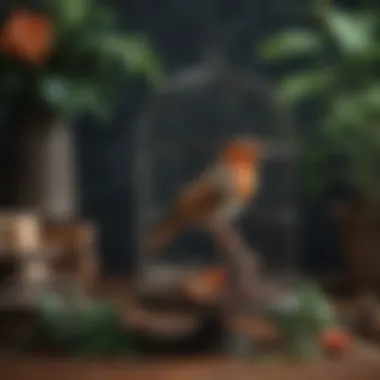
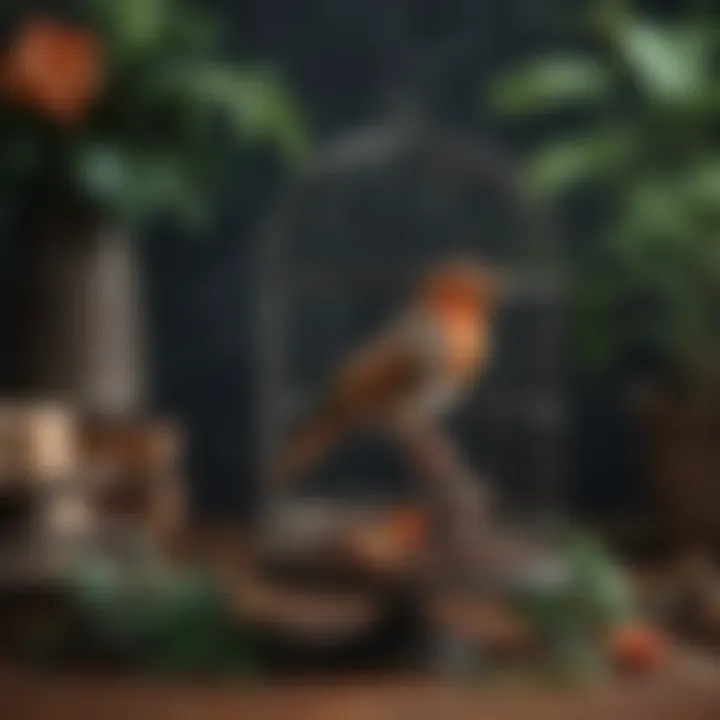
When selecting a bird, one should consider how the unique traits can influence care requirements, interaction possibilities, and the overall relationship dynamic.
Parakeets: The Friendly Feathered Friends
Parakeets, or budgerigars, are often the go-to choice for first-time bird owners. Their bright colors and lively behavior easily allure potential owners. These birds are very social creatures, thriving on interaction with humans and other birds.
Their friendly disposition allows for easy bonding. Parakeets are known to learn simple tricks and even mimic sounds, adding a layer of entertainment to their care. Interestingly, parakeets can recognize and respond to their owner’s voice, which deepens the relationship. The key benefit of having parakeets as pets is their relatively low maintenance needs compared to larger birds, paired with a high potential for companionship and interaction.
- They generally live between 5 to 10 years, making them a suitable option for families.
- Their small size makes them adaptable to various living situations, from apartments to larger homes.
Cockatiels: Personable and Playful
Cockatiels bring a different flavor to the bird ownership experience. They are renowned for their playful nature and charming call, often imitating whistles and tunes. Cockatiels have a knack for forming strong bonds with their owners; they actively seek out attention by snuggling or playing.
Their curious demeanor invites interaction. They enjoy being part of family activities, perched on a shoulder or playing on a nearby table. Cockatiels can also be trained, often responding well to consistent commands. A unique aspect is their crest, which expresses their mood, showing whether they are curious, playful, or alarmed. This insight into their feelings allows owners to respond appropriately to their needs.
- Cockatiels can live up to 15 years, making long-lasting companions.
- Their engaging personality brings joy, though they do require attention to remain happy and healthy.
African Grey Parrots: The Thinkers of the Avian World
African Grey Parrots are often referred to as the "Einsteins of the bird world" due to their exceptional intelligence. Their remarkable ability to mimic human speech is legendary, but it goes beyond mere mimicry; they can understand context and even engage in conversations. This cognitive skill makes them more demanding pets, as they require mental stimulation and social interaction to flourish.
These birds form strong emotional bonds with their owners and can express a range of emotions, making their companionship very rewarding. However, their intelligence means they need more than just physical care; their environments must be enriched with toys and challenges to keep them from becoming bored.
- African Grey Parrots can live 30 years or more, emphasizing the long-term commitment involved in their care.
- They require a great deal of interaction and can develop behavioral problems if neglected.
In summary, understanding the individual traits of parakeets, cockatiels, and African Grey parrots equips potential bird owners with critical insight into nurturing character and lifestyle compatibility. Each species brings unique benefits and requires varying levels of engagement, and choosing the right one can lead to many fulfilling years of companionship.
The Influence of Birds on Human Mood and Wellbeing
Birds are not just charming creatures to have around; they can significantly impact human mood and overall well-being. Their vibrant personalities and engaging behaviors offer companionship that goes beyond the ordinary. The soothing tuneful chirps of a budgie or the playful antics of a cockatiel can uplift spirits in ways that often surprise pet owners. Here, we delve into how these feathered friends enhance emotional health and foster pleasant environments.
The Therapeutic Benefits of Bird Companionship
Having a bird as a pet can be a emotionally beneficial experience. Studies indicate that interacting with animals, including birds, can lead to reduced stress, anxiety, and depression. The simple act of petting or watching a bird can trigger the release of oxytocin, often called the "love hormone."
- Calming Presence: The rhythmic sound of a bird's chirp or song acts as a natural stress reliever, evoking a sense of tranquility. For example, a parakeet whistling a cheerful tune can instantly lift the ambiance in a room, making it feel more welcoming and relaxed.
- Routine and Responsibility: Owning a bird fosters a sense of responsibility. This daily care routine not only helps to structure one’s day but also gives a sense of purpose. Many owners find joy in feeding their birds and maintaining their cages, tasks that create a rewarding feedback loop in the brain.
- Social Interaction: Birds are naturally social animals and can encourage their owners to engage more socially. They often mimic sounds and words, promoting interaction and communication. The thrill of teaching a bird to talk or show off its tricks can draw in family members and friends alike, stimulating joy and laughter.
- Non-Material Rewards: Unlike material possessions, the joy derived from birds is often less fleeting. Their endearing habits, like preening or playfully engaging with toys, develop emotional ties that can significantly affect one’s mood.
Observational Joys: The Allure of Bird Behavior
Observing birds can feel like peeking into a small world of intrigue. The spontaneity and playfulness of pet birds can morph a mundane day into a memorable experience. Owners often find themselves captivated by the quirks and characteristics that make each species unique.
Birds have the gift of mesmerizing their owners with simple actions, creating a bond that is both fulfilling and uplifting.
- Natural Curiosity: Birds have an innate curiosity that can be contagious. When a conure hops onto a perch to investigate a new object, it elicits joy in its owner, reminding them of life’s simple pleasures.
- Play and Discovery: Engaging with a pet bird can mean setting up an obstacle course or introducing new toys to their environment. Watching a bird explore its surroundings provides not just entertainment but also a sense of accomplishment for the owner when their pet thrives in a stimulating atmosphere.
- Unique Personalities: Each species may come with its quirks. An African Grey might showcase its intelligence in unique ways, while a lovebird displays its affectionate nature visibly. This variance can lead to a deeper understanding of avian behavior, engaging the pet owner mentally as they learn the science behind these actions.
Birds provide more than just companionship; they bring joy, reduce stress, and add vibrancy to everyday lives. Their influence on human mood and well-being is profound, making them ideal pets for those seeking connection and warmth.
Myths and Misconceptions
Understanding the myths and misconceptions surrounding pet birds is crucial for both current bird owners and potential bird parents. While these enchanting creatures can bring immense joy and companionship, they are often perceived through a lens colored by misunderstandings. These fallacies can affect how people approach bird ownership, influencing everything from buying decisions to care practices.
By addressing these misconceptions, we can provide a clearer picture of what it means to have a bird as a companion. Doing so helps nurture a more informed community that appreciates the unique needs and benefits of avian companions.
Common Fallacies About Pet Birds
- Birds Are Low-Maintenance Pets
One of the prominent misconceptions is that pet birds are low-maintenance compared to other animals. Some newcomers might think that birds simply sit in a cage, chirping away like a living decoration. However, they require considerable care, including a balanced diet, social interaction, and mental stimulation. Remember, these are not just visual ornaments but living beings with sophisticated needs. - Birds Don’t Bond with Humans
Another typical myth suggests that birds are aloof and don’t develop meaningful relationships with their owners. In reality, many birds, particularly species like cockatiels and parakeets, are quite sociable and form strong attachments to their humans. They can exhibit affectionate behavior, echoing sentiments akin to those shown by cats or dogs. - All Birds Can Talk
Not all birds are capable of speech, yet this myth tends to persist, especially among those unfamiliar with avian species. While some birds like African Grey Parrots are renowned for their ability to mimic human words, others do not have this capacity at all. It’s vital to research species-specific traits to avoid unrealistic expectations. - Birds Can Safely Fly Freely Around the House
While many birds enjoy the freedom of flight, it’s not always safe. There are numerous hazards at home, from windows to ceiling fans that can pose risks. Ensuring a secure environment is paramount for their safety. Educating oneself on potential dangers can make a world of difference for an avian friend.
The Reality Behind Bird Care
The true picture of bird care involves a multitude of essential tasks that go beyond basic feeding.
"Birds require both physical and emotional nourishment to thrive."
- Diet: Birds need a specialized diet rich in fruits, vegetables, and pellets. It's not just about throwing some seeds in a bowl; proper nutrition is a cornerstone of their health.
- Social Interaction: Birds are inherently social animals. They require bonding time with their owners or other birds to flourish mentally and emotionally.
- Enrichment: They need a stimulating environment. Toys, perches, and activities are vital to keep their minds active and curious.
- Regular Checkups: Just like any other pet, birds should have routine vet visits to keep an eye on their health. This includes preventive measures and vaccinations where necessary.
In summary, while myths about pet birds may seem innocent or trivial, they can have significant implications for responsible bird ownership. By peeling back the layers of these misconceptions, we can pave the way for a more rewarding relationship with our feathered companions.
Long-Term Commitment and Considerations
When considering bringing a bird into your home, it’s essential to grasp the weight of long-term commitment this entails. Birds, with their captivating personalities and social nature, can be delightful companions; however, they are not just short-lived pets. They require attentive care and consistent engagement over many years. Understanding this commitment is crucial for ensuring a harmonious and fulfilling relationship with your feathered friend.
Lifespan of Pet Birds
Pet birds can have remarkably long lifespans, often outliving other popular companion pets like cats and dogs. Species such as parrots and canaries may live anywhere from 10 to over 50 years, depending on their breed and care. For example, a well-cared-for African Grey Parrot might live up to 60 years or more, making it a lifelong companion for its owner.
This extensive lifespan necessitates careful thought about your future plans. Consider the following factors:
- Life Changes: As life progresses, you might encounter changes like moves, career shifts, or family dynamics. It’s vital to think about whether a bird would fit comfortably into these changes.
- Financial Responsibility: Quality avian care often comes with a price tag. This includes food, veterinary visits, and any necessary cage and environment adjustments.
- Health Considerations: An aging bird might need specialized care, medications, or adjustments to their diet, which can also be a long-term financial commitment.
If you find yourself wondering whether you can provide this level of care for decades, it may be wise to reassess whether now is the right time to adopt a bird.
Preparing for the Future
Planning isn’t just for marriage or parenthood; it’s just as pertinent when considering to welcome a bird into one’s home. Preparing for the future involves multiple layers, ensuring that both you and your pet can sustain a positive relationship over the years.
Some steps you might consider include:
- Environmental Stability: Birds thrive in stable environments. It’s beneficial to choose a living situation that won’t require frequent moves.
- End-of-Life Planning: Consider what happens as your pet ages. Make arrangements for their continued care, whether that includes a backup caregiver or even plans for their well-being post your own lifetime.
- Educating Yourself: Familiarize yourself with potential health issues common to the species you're considering. The more informed you are, the better decisions you can make for your bird's care over its life.
In essence, understanding that birds are a long-term commitment is necessary for aspiring bird owners. It requires an awareness of potential future scenarios and a readiness to adapt. When you’re open to those considerations, you’re already on the right path to a rewarding relationship with your companion bird.
"A pet is for life, not just for a season. Investing time and care in your feathered companion ensures that you'll enjoy their company for many years to come."















